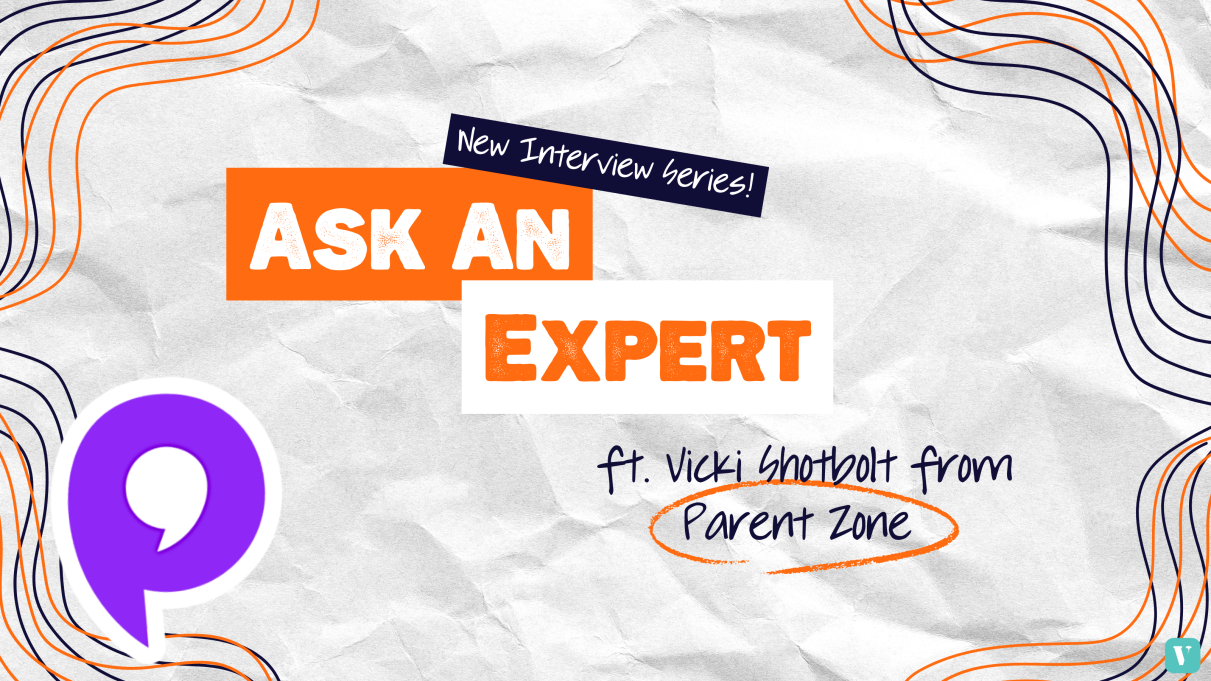
Our Ask an Expert series is your chance to hear directly from professionals about topics that matter to you. We ask the questions you want answers to and explore what experts really think about topics like tech, creative fields, careers, and more. If there’s someone you’d love us to talk to or a topic you’ve always wondered about, get in touch and let us know!
Parent Zone’s founder and CEO, Vicki Shotbolt, leads a team that educates and assists families in navigating the challenges and complexities of digital family life whilst demonstrating the benefits and opportunities it brings. Her team creates and delivers media literacy interventions, tools, and programmes, while collaborating with organisations across the UK and globally to extend their reach to everyday parents. We wanted to hear directly from her about her journey as someone who started her own business, and to gain valuable insights on practical ways young people can keep themselves safe online. Here's what she had to say...
Interview conducted by VoiceBox's Lauren Louisha

Hey Vicki, thank you for joining us for our Ask An Expert Insights interview series. It’s such a pleasure to have you! Could you tell our readers more about the work you do?
Of course! It’s really all about trying to unlock the benefits of technology for families and helping them navigate the problematic stuff. We deliver projects with big partners like Google and YouTube in schools, and we also work with parents to help them understand tech and how they can support their children to flourish.
What was the inspiration behind starting Parent Zone?
I set Parent Zone up 20 years ago, just as things like social media and YouTube were being invented. It was so obvious that technology was going to transform everything, including families, and I thought it was important that there was an organisation around to respond to that.
Congratulations on your 20-year anniversary of founding Parent Zone, that's just incredible! What's one thing you wish you knew in the beginning that you know now?
I suppose more than anything, it’s that sometimes it is just about keeping going. There is so much pressure for startups to scale and become super successful overnight. The reality isn’t like that at all. Real success comes from sticking with it and building a team for the long term.
Do you have a particular project that you’ve worked on that's a standout favourite?
That’s really tough. All our projects are special in one way or another, but our primary school project with Google is a bit of a favourite. Mainly because it was the first time anyone had approached internet safety with an empowerment approach. It’s called Be Internet Legends, and it is all about giving younger children the skills they need to be safer and more confident online. It tells them what they can do and celebrates the fun and amazing things that they can do online rather than simply focusing on the negative, scary ‘ban and block’ messaging. It’s also the first project we really scaled, so it tested us as an organisation to manage a programme that is now in 80% of primary schools in the UK.
Do you have any advice for young women wanting to launch their own company?
I’d say go for it! Don’t be afraid of failure - we all have them, and it is honestly true that you learn the most from the mistakes you make. Be ready to ask for help and take advice, but remember that you know your business idea better than anyone, and so your vision is the thing that’s going to make it a success.
Over the years, you’ve spoken at countless events, from international panels, seminars and parliament. What's the most valuable advice you’d offer to others about public speaking?
Trust the fact that the reason you’ve been asked to speak is because you have something the audience wants to hear. If you know your subject area and feel passionately about it, that will come across - even if you feel nervous and even if public speaking isn’t your favourite thing.
For those who don't know what child financial harm is, are you able to break down its definition?
The term covers a wide group of harms that include sextortion, money muling, gambling-related harms and scams. It is basically any harm that is facilitated by or is directly related to money.
What are the 3 signs of child financial harm that young people could look out for?
First up, something boys should be aware of. They can be particularly vulnerable to sextortion because, unlike many girls who have become used to ignoring unsolicited sexual images, boys might not be as prepared, which can increase their risk. If you receive an unexpected or unsolicited sexual image, it’s important not to react, other than by reporting it.
The second one is unexpected gifts, freebies or anything that promises a ‘make money quick’ opportunity. There is no such thing as a free lunch.
The last one is for the gamers. The games industry bases their financial model on the gambling industry. Remember that when you’re playing.
Are there steps a young person can take to limit the possibilities of being financially harmed online?
First thing I’d say is that it’s never your fault if you are financially exploited. The person at fault is the perpetrator. Scams are rife online, and millions of people, young and old, fall for them. It’s hard to protect yourself, but taking care to limit the identifiable personal information you put online can reduce the risk of identity theft. Keeping your security software up to date. Using incognito mode and VPNs and never using public Wi-Fi to do financial transactions all help. Using dodgy sites, finding cheap deals, and anything a bit sketchy online is likely going to put you at greater risk.
What should a young person do if they believe they are being financially exploited?
I can’t say this loudly enough. Report it. Tell someone. The police, the bank, your family - anyone. It’s not your fault. Even if you feel silly or you’re worried you’ll get a hard time for doing something you maybe shouldn’t have done, it’s critical you reach out for help. The people who run these scams (including sextortion) are gangs and often organised crime, so there is no shame, and they need to be reported.
Thank you for joining us today. It’s been such an honour to have you! Before we let you go, if you could go back in time and give your younger self advice, what would it be?
Simple - know that things get better and better. I was a miserable teen, and from the age of 21, things turned a corner.
Check out more of the work that Parent Zone does here!
Support Young Creators Like This One!
VoiceBox is a platform built to help young creators thrive. We believe that sharing thoughtful, high-quality content deserves pay even if your audience isn’t 100,000 strong.
But here's the thing: while you enjoy free content, our young contributors from all over the world are fairly compensated for their work. To keep this up, we need your help.
Will you join our community of supporters?
Your donation, no matter the size, makes a real difference. It allows us to:
- Compensate young creators for their work
- Maintain a safe, ad-free environment
- Continue providing high-quality, free content, including research reports and insights into youth issues
- Highlight youth voices and unique perspectives from cultures around the world
Your generosity fuels our mission! By supporting VoiceBox, you are directly supporting young people and showing that you value what they have to say.





